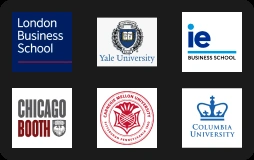
Alliance Manchester MBA
Alliance Manchester MBA OverviewIntroduction to the Alliance Manchester MBA Progr…
Table of Contents

An MBA in Europe in 2024 offers unparalleled opportunities to gain a world-class education, fast-track your career, and experience life in some of the globe’s most vibrant cities. With renowned institutions like INSEAD, HEC Paris, and London Business School, Europe is an ideal destination for ambitious professionals. European MBA programs are known for their innovative curriculum, focus on international business, and opportunities for global networking. Additionally, Europe offers a more affordable and often shorter alternative to traditional U.S. MBA programs, making it a top choice for international students.
Europe’s appeal lies in several key factors that set its MBA programs apart from the rest of the world:
Europe's focus on innovation, sustainability, and entrepreneurship further enhances its reputation as a premier destination for MBA education, appealing to future business leaders looking for cutting-edge learning environments.
The number of Indian students pursuing an MBA in Europe has surged in recent years. There are several reasons for this growing trend:
Some of the key advantages of pursuing an MBA in Europe include:
One of the most important decisions you’ll make when choosing an MBA in Europe is whether to opt for a 1-year or 2-year program. Here’s a breakdown of the pros and cons of each:
Program Length | Pros | Cons |
| 1-Year MBA | Faster return to the workforce, lower overall cost | Intense workload, less time for internships |
| 2-Year MBA | More time for internships, networking, and career exploration | Higher cost, longer time out of the workforce |
The 1-year MBA is ideal for professionals who want to advance their careers quickly and return to the job market without taking too much time away. These programs are common in schools like INSEAD, IE Business School, and IMD. On the other hand, 2-year programs are suited for those looking for a more in-depth learning experience with additional time for internships and career exploration, as seen at schools like London Business School.

Europe is becoming a top choice for MBA aspirants due to several key advantages that distinguish its programs from those in other parts of the world, particularly the U.S. and UK.
Europe boasts some of the best business schools in the world. Institutions like INSEAD (France), London Business School (UK), HEC Paris (France), and IE Business School (Spain) consistently rank among the top global MBA programs. These schools are recognized for their academic rigor, innovative teaching methods, and strong global networks. Programs emphasize leadership, strategic thinking, and a practical approach to business challenges, which help students succeed in diverse industries across the globe.
One of the most appealing aspects of pursuing an MBA in Europe is the affordability. While top U.S. MBA programs can cost up to $200,000, many European MBA programs offer tuition fees that are significantly lower, ranging from €30,000 to €120,000, depending on the institution. Schools like IE Business School and SDA Bocconi are known for offering high-quality education at lower costs compared to U.S. business schools. Additionally, many schools provide generous scholarships and financial aid, making Europe a cost-effective option for international students.
Europe is a melting pot of cultures, and this diversity is reflected in its business schools. Students from around the world come to Europe to pursue their MBAs, creating a rich multicultural environment. For example, INSEAD has students from over 90 different countries. This diversity fosters cross-cultural understanding, which is invaluable in today's global business landscape. Studying in such an environment also provides the opportunity to build a global network of peers, alumni, and industry professionals, which can open doors to international career opportunities.
Europe is home to several of the world’s leading business hubs, such as London, Paris, Berlin, and Zurich. This proximity provides MBA students with unparalleled access to multinational corporations, startups, and key industry leaders. Schools often leverage these connections to offer students real-world business projects, internships, and networking opportunities. Being at the heart of global trade and finance, European MBAs offer students the chance to interact with global business leaders and participate in conferences, seminars, and events that can enhance their careers.
Many European countries offer favorable post-graduation work visa policies for international students. For example:
These visas, along with initiatives like the EU Blue Card (which allows highly skilled non-EU citizens to work and live in Europe), make it attractive for international students to study and settle in Europe after their MBA.
European business schools are increasingly focusing on innovation, sustainability, and global business practices. For instance, schools like HEC Paris and ESADE Business School integrate sustainable business strategies into their curriculum, preparing students for leadership roles in the new, sustainability-driven economy. Furthermore, European schools are at the forefront of digital transformation, innovation, and entrepreneurship, offering specializations in areas like digital business, artificial intelligence, and green energy.
This focus aligns with the growing global demand for business leaders who can address complex challenges like climate change, global inequality, and technological disruption.
Europe is home to several of the world’s best MBA programs, offering globally recognized education, diverse specializations, and unique features. Below is a detailed overview of the top business schools in Europe, including their rankings, specializations, and standout characteristics.
Table summarizing the top business schools in Europe for MBA programs, including their rankings and specializations:
Business School | Location | Rankings (Europe/Global) | Key Specializations | Program Length |
| INSEAD | France | Top 3 in Europe/Global | Strategy, Entrepreneurship, International Business | 1 year |
| HEC Paris | France | Top 5 in Europe/Top 20 Global | Finance, Luxury Management, Entrepreneurship | 16 months |
| London Business School | UK | #1 in Europe/Top 5 Global | Finance, Consulting, Entrepreneurship | 15-21 months |
| IE Business School | Spain | Top 10 in Europe/Global | Entrepreneurship, Innovation, Digital Business | 1 year |
| ESADE Business School | Spain | Top 20 in Europe/Global | International Business, Marketing, Finance | 12-18 months |
| IMD Business School | Switzerland | Top 10 in Europe/Global | Leadership, General Management, International Business | 1 year |
| SDA Bocconi | Italy | Top 10 in Europe | Luxury Brand Management, Marketing, Corporate Finance | 1 year |
| ESCP Europe | Multiple Campuses | Top 20 in Europe | International Management, Business Strategy | 1 year (multiple campuses) |
| Rotterdam School of Management | Netherlands | Top 10 in Europe | Sustainability, Supply Chain Management, Finance | 1 year |
| ESMT Berlin | Germany | Top 30 globally | Technology Management, Innovation, Entrepreneurship | 1 year |
Applying for an MBA in Europe requires meeting a combination of academic, professional, and personal criteria.
Requirement | Details |
| Bachelor’s Degree | A recognized undergraduate degree in any field. |
| Field of Study | No strict requirement (business, economics preferred). |
Requirement | Details |
| Minimum Years of Experience | Typically 3-5 years for full-time MBA programs. |
| Executive MBA | Usually requires 5-10 years of experience in managerial roles. |
| Relevance | Experience in management, leadership, or specialized roles is preferred. |
Test | Minimum Score Required | Notes |
| IELTS | 6.5 to 7.5 overall | Most programs require at least a 6.5 or 7.0 in each section. |
| TOEFL | 90 to 100 (iBT) | Required for non-native English speakers. |
| Exemptions | Case-by-case basis | Exemptions may apply if the applicant's previous education was in English. |
Requirement | Details |
| GMAT | Competitive programs expect 600+, with many top programs seeking 650-700. |
| GRE | Accepted by most schools as an alternative to GMAT. Aim for the 85th percentile. |
| Waivers | Available in some schools based on academic or professional background. |
Requirement | Details |
| Statement of Purpose (SOP) | A 1-2 page document outlining your motivations, career goals, and why you chose the MBA program. |
| Letters of Recommendation (LORs) | Typically 2 letters, often from employers or supervisors, highlighting your professional achievements and leadership potential. |
Criteria | Details |
| Interviews | Conducted post-application screening, either in-person or virtually, to assess candidate fit. |
| Extracurricular Activities | Schools value candidates with leadership experience in extracurriculars or community service. |
| Leadership Potential | Demonstrated through work achievements, volunteer work, or by starting new initiatives. |

Pursuing an MBA in Europe offers world-class education at more affordable rates than other global destinations, particularly the U.S. However, costs can still vary depending on the school, city, and living expenses. Let's break down the tuition fees, living costs, and available scholarships for international students, especially Indian students.
Tuition fees for an MBA in Europe vary greatly depending on the institution. Here are the average tuition fees for some of the top European business schools:
Business School | Country | Average Tuition Fees |
| INSEAD | France | €91,000 - €110,000 |
| HEC Paris | France | €76,000 - €78,000 |
| London Business School | UK | £92,735 - £127,590 |
| IE Business School | Spain | €72,000 - €90,000 |
| ESADE Business School | Spain | €70,000 - €78,000 |
| IMD Business School | Switzerland | €89,000 - €96,000 |
| SDA Bocconi | Italy | €62,000 - €73,000 |
| ESMT Berlin | Germany | €49,000 - €50,000 |
| Rotterdam School of Management | Netherlands | €54,000 - €61,000 |
Living expenses will significantly affect the overall cost of your MBA. Below is a breakdown of average living costs in major European cities for international students:
City | Cost of Living (per month) |
| Paris | €1,200 - €1,500 |
| London | £1,500 - £1,800 |
| Berlin | €800 - €1,200 |
| Barcelona | €1,000 - €1,300 |
| Zurich | CHF 2,000 - CHF 2,500 |
These figures include accommodation, utilities, food, transport, and miscellaneous expenses, but they can vary depending on your lifestyle and the housing option you choose (shared apartments, student housing, etc.).
European business schools offer a wide range of scholarships aimed at reducing the financial burden on international students. Below are some common scholarship types:
Many schools offer merit-based scholarships or need-based financial aid. Examples include:
Indian students have access to several scholarships specifically tailored to them:
Europe offers a promising job market for MBA graduates, especially in high-demand industries such as consulting, finance, technology, and luxury. Here’s a concise breakdown of the trends, salaries, and job search strategies for MBA graduates in Europe.
Industry | High-Demand Sectors | Top Hiring Companies |
| Consulting | Strategy, Operations, Management Consulting | McKinsey & Company, BCG, Bain & Company |
| Finance | Investment Banking, Private Equity, Asset Management | Goldman Sachs, JP Morgan, Barclays |
| Technology | IT Management, Data Analytics, Product Development | Google, Amazon, Microsoft |
| Luxury & Retail | Brand Management, Marketing, Business Strategy | LVMH, Gucci, Richemont |
| Healthcare & Pharma | Strategy, Operations, Product Management | Roche, Novartis, Sanofi |
Country | Average Salary (USD) | Top Sectors |
| Switzerland | $123,000 | Finance, Consulting, Pharmaceuticals |
| United Kingdom | $112,000 | Finance, Consulting, Technology |
| Germany | $105,000 | Manufacturing, Technology, Automotive |
| France | $98,000 | Consulting, Luxury Goods, Healthcare |
| Netherlands | $95,000 | Technology, Finance, Supply Chain |
| Spain | $85,000 | Consulting, Real Estate, Hospitality |
Industry | Top Companies |
| Consulting | McKinsey & Company, Bain & Company, BCG |
| Finance | Goldman Sachs, JP Morgan, Barclays |
| Technology | Google, Amazon, Microsoft, Apple |
| Luxury & Fashion | LVMH, Gucci, Chanel |
| Pharma & Healthcare | Roche, Novartis, Sanofi, Pfizer |
Support Service | Description |
| Career Coaching | Personalized career coaching to help with CV building, interview prep, and career planning. |
| Company Recruitment Events | Schools organize recruitment fairs where multinational companies interview students for full-time roles. |
| Alumni Networks | Schools like INSEAD and LBS have large global networks to help students access job opportunities and networking events. |
| Internships | Many MBA programs offer internship opportunities, allowing students to gain hands-on experience in their chosen field before graduation. |
Strategy | Details |
| Leverage Alumni Networks | Utilize your business school’s alumni network to access job openings and build connections. |
| Understand Visa Requirements | Countries like Germany and the UK offer post-study work visas, allowing graduates to stay and seek jobs. |
| Target Multinationals | Focus on multinational companies that sponsor visas, such as Google, Amazon, and McKinsey. |
| Learn Local Languages | Learning languages like French, German, or Spanish gives an edge, especially in client-facing roles. |
Many European countries offer favorable post-study work visas for international MBA graduates, providing pathways for gaining valuable work experience and eventually transitioning to long-term residency. Here's an overview of the options:
Country | Post-Study Work Visa Duration | Details |
| Germany | 18 months | Graduates can stay up to 18 months to find employment. |
| United Kingdom | 2 years | The UK offers a 2-year Graduate Route visa to international graduates. |
| France | 2 years | Offers a Temporary Residence Permit (APS) for 24 months to search for jobs or start a business. |
| Netherlands | 1 year | The Orientation Year Visa allows graduates to stay for 1 year to seek employment. |
| Spain | 1 year | A 1-year visa extension is available for non-EU students seeking employment. |
| Ireland | 2 years | The Third Level Graduate Scheme allows graduates to stay for 2 years to seek work. |
After securing a job, international graduates can apply for long-term work permits. The process varies by country:
Country | Permanent Residency Pathway |
| Germany | Indian graduates can apply for permanent residency after 2 years of working with an EU Blue Card. |
| United Kingdom | After 5 years on a Skilled Worker Visa, graduates can apply for Indefinite Leave to Remain (ILR). |
| France | Graduates can apply for permanent residency after 5 years of continuous employment. |
| Netherlands | Graduates can apply for permanent residency after 5 years of legal stay in the country. |
The EU Blue Card is a work permit designed for non-EU nationals, including Indian MBA graduates, who secure high-salary positions in the European Union. Benefits include:

Yes, several business schools in Europe offer GMAT waivers or alternatives for MBA applicants.
Business School | Country | GMAT Waiver Conditions |
| IE Business School | Spain | Waivers for applicants with strong academic records or extensive work experience. |
| SDA Bocconi | Italy | May offer waivers based on professional achievements. |
| ESMT Berlin | Germany | Waivers based on high academic scores or management experience. |
| Imperial College Business School | United Kingdom | GMAT not required if academic and professional credentials are strong. |
Pros | Cons |
| Avoids taking a time-consuming, costly exam. | Limited to schools offering GMAT waivers or alternatives. |
| Can focus on demonstrating work experience and leadership skills. | May reduce competitiveness for top-tier schools. |
An MBA in Europe offers global exposure, diverse career opportunities, and excellent post-study work options. Whether you aim to advance in consulting, finance, or tech, European business schools provide the perfect platform to achieve your goals. With GMAT waivers and residency pathways like the EU Blue Card, it's an attractive destination for international students.
Looking to start your MBA journey in Europe? Let MastersBuddy guide you! We’ll help with selecting programs, securing scholarships, and navigating visas. Contact us today to take the next step toward your MBA dreams!

